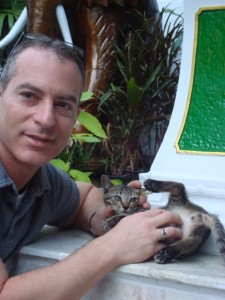Arnold Plotnick DVM, MS, ACVIM has spent his career taking care of felines. He is the founder of Manhattan Cat Specialists, a feline-exclusive veterinary facility on Manhattan’s upper west side. In addition to looking after his feline patients, Dr. Plotnick spends much of his time writing and is this years’ recipient of the Winn Feline Foundation Media Appreciation Award. Each year this award is presented to a writer, journalist or media personality who has demonstrated a commitment to educating the public in regards to feline health and welfare. Goodnewsforpets.com interviewed Dr. Plotnick on his accomplishments that led to receiving the award.

What does it mean to you to receive the Winn Feline Foundation Media Appreciation Award?
It’s definitely an honor. The Winn Feline Foundation is a prestigious organization that is well known and admired by all veterinarians, especially those of us with a focus on feline medicine. The list of previous recipients reads like a Cat Writers’ hall-of-fame, so I’m humbled to be in such impressive company.
What made you decide to dedicate your practice and profession to exclusively felines?
I’ve always had an affinity for cats. During my internship and residency, I developed a reputation for being “the cat guy”, and many of the feline cases were funneled my way. This spilled over into private practice. When I finally decided to open my own practice, I figured it was time to heed my calling and focus solely on cats.
Do you have any cats of your own? If so can you tell us about them?
I currently have two cats, Mittens and Glitter. Mittens is a ten year old polydactyl calico with a lot of personality quirks. I posted some videos on YouTube showing her drinking water with her paw and directly from the faucet, and eating odd things like tomatoes and matzoh – things you wouldn’t expect from a carnivore. Glitter is a gray and white kitten. I adopted her a month ago. She’s 14 weeks old and is absolutely delightful. Last year, my cat Crispy passed away after a brave battle with cancer. Although Crispy and Mittens weren’t particularly friendly to each other, they were used to having each other around. I could tell Mittens was lonely. I was hoping that a new kitten would brighten up her life, and it seems to have.
You have a blog, “Cat Man Do”. Why did you start blogging?
I’ve been writing for magazines for a few years now. Most of the articles were of a medical nature, as I like educating the public about what’s happening in veterinary medicine. I think an educated pet owner is a better pet owner. But my other passion in life is traveling. During my travels, I often encountered street cats that were friendly and trusting, and I had many positive interactions with them, and I wanted to share my experiences with people who I knew would appreciate them. The magazines and newsletters I was writing for weren’t really an appropriate outlet for stories about these international feline encounters. I thought a blog would be the best venue for these, as well as for other tales of a more personal nature.
Do your cats help or inspire you with your blog posts? How so?
They do. Last year, during my cat Crispy’s annual physical, while palpating her abdomen, I felt a mass. She had no clinical signs of illness at all. Ultrasound revealed an intestinal tumor. The tumor was surgically removed, but she had post-operative complications, including a harrowing cab ride to the emergency clinic for a blood transfusion. The experience dramatically opened my eyes to what my clients go through when their cats are sick. I ended up blogging about the entire episode about what it was like being on the other side of the examination table and how it ultimately made me a better veterinarian. The blog posts were very well received and I got many comments about those posts.
You have a pretty active social media following. What is the message you want to get across to your followers?
Mainly that cats are special and that we need to treat them as such. They are unique and should not be treated, medically, like small dogs.
What is your favorite social media platform and why?
I like Facebook. A lot of my Facebook friends are also clients of mine. It’s easy to post photos and videos on Facebook. I’m not much of a Twitter user. I find the 140 character limit a bit too restrictive.
You tend to share a lot of videos of your cat on YouTube and Twitter. Do you have an all-time favorite video? Can you share it with us.
I think the video of Mittens eating matzoh. I had a box of it on the counter, and I thought I’d let her take a sniff, like I often do when I’m eating and she’s nearby. I was unprepared for her response. I like the sound effects. You can really hear her crunching it. It’s hilarious. She seems more interested in crunching on it than in eating it, as she spits it out on the floor once she bites off a piece. See for yourself: https://www.youtube.com/watch?v=qy6azJ69vHs
Your blog states that you are a featured article writer for Catster and a frequent contributor for Catnip Newsletter. Can you tell us about the type of articles you write for them?
I write a column called “Body Parts” for Catster. The column focuses on one particular organ. I explain its function and describe what happens when things go awry. I’ve done columns on the liver, kidney, heart, bladder, adrenals, pancreas, lymph nodes, and spleen. Eventually I’ll run out of body parts, I suppose. For now, however, there’s enough to keep me busy for a while. For Catnip, the articles tend to be of a more medical nature, and I’m given a bit more column space, allowing me to go in greater depth. The editor of Catnip encourages me to write about less common topics, as there are only so many times you can write about diabetes and hyperthyroidism before it becomes boring. It’s a fun challenge to come up with obscure or neglected aspects of feline medicine.
Do you have a blog post or article that you are most proud of? Tell us about it and why.
About three years ago, I wrote an article about how powerful words can be in a veterinary setting. The article details a humbling episode I experienced when I took this for granted, and lost a client over it. I didn’t like the way the final edit appeared in the magazine, so I posted the original version of the article on my blog. Some days I feel like I hit the nail on the head better than other days, and for this article, I think I was firing on all cylinders. I like the way the article reads and the points that it makes.
Are there any upcoming advances in feline medicine that you are excited about?
Yes. A recently published article details a treatment for Feline Infectious Peritonitis (FIP). This is a viral disease that is 100 percent fatal and is the most distressing diagnosis a veterinarian can make. It tends to strike young cats, and it shows no mercy. Not having a treatment for the disease has been the bane of our existence for decades. This article describes the use a protease inhibitor in the treatment of the disease. In the article, all of the cats that had FIP recovered once treatment was instituted, even in cats with severe clinical signs. If this turns out to be true, and if the treatment is easy to administer and is cost effective, it would truly be one of the absolute greatest advances in veterinary medicine in my lifetime. I can’t overemphasize how terrific and monumental this would be. You can read the study for yourself if you like at this link: http://jav.ma/FIPtreatment
Is there anything else you would like to share with Good News For Pets?
I would like to reiterate how humbled and appreciative I am for being selected to receive the Winn Foundation Media Appreciation Award, and how thankful I am that people enjoy my posts and my blog.
Connect with Dr. Plotnick




